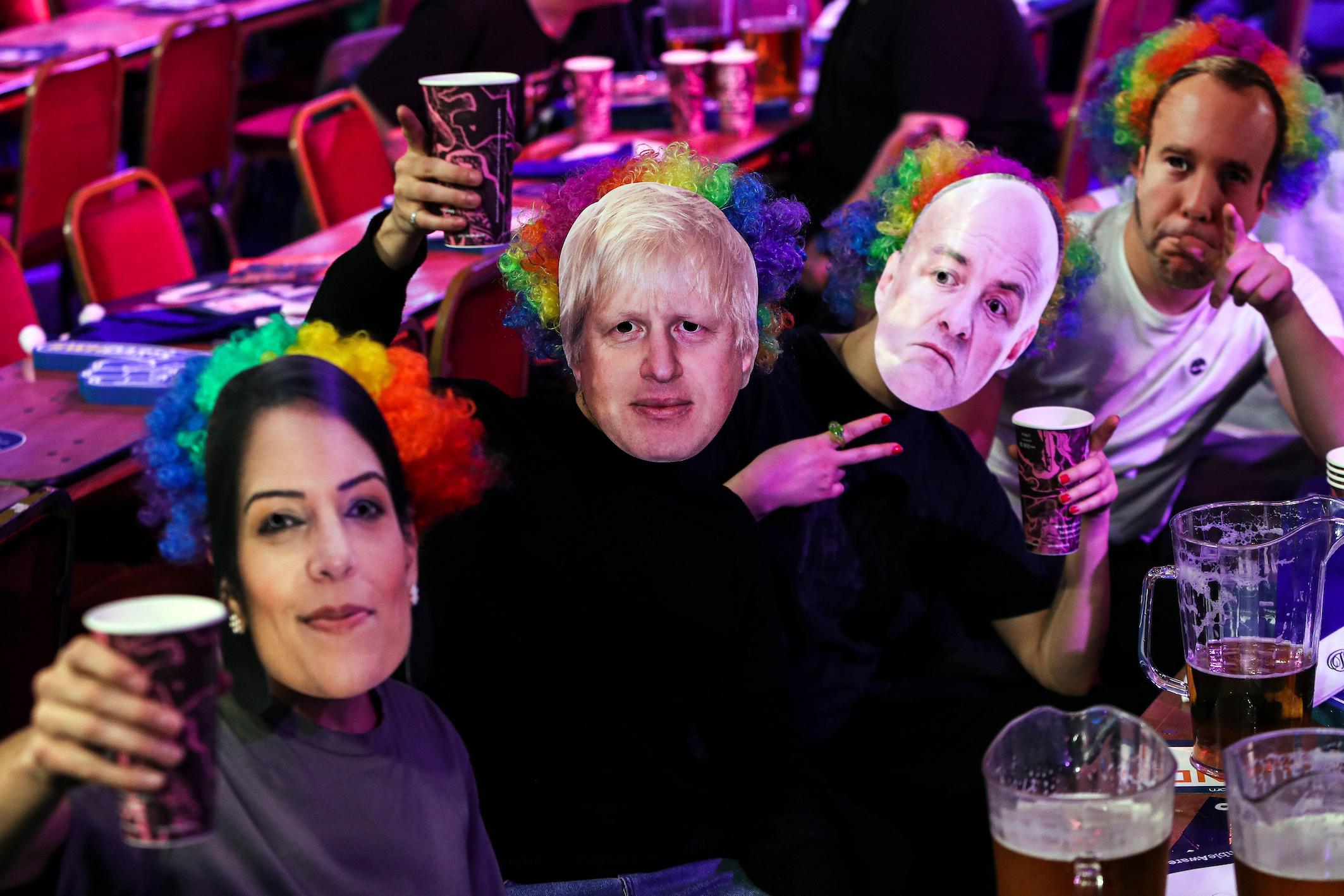Bolton's unique place in the pandemic that changed everything
Bolton was quick to understand the need to get vaccines out to communities as well as getting people to come to clinics - but now the town needs answers from the COVID Inquiry
“It wasn’t here one day but it was here the next day.”
Like most of the country, Anna-Marie Watters had been watching the news about Covid’s emergence in China from late 2019 and like most of the country was doubtful it was going to hit this island hard. But in January 2020 it did.
“And when the first lockdown came our reaction was almost instantaneous,” Watters, CEO of the Hub at Westhoughton, told The Bolton Lead
The group had been providing coding classes, yoga sessions and elderly people’s activities since it took over the former community college in the town in 2017. But they came to a halt with the March 2020 lockdown. Instead, it became the dropping-off hub for food deliveries for isolated people.
An “army of volunteers”, including Lesley Monks, got to work, delivering bread donated by Warburtons and fruit and veg. “Then we were picking up prescriptions for people who were isolated and vulnerable,” says Monks. “We were doing shopping, a befriending telephone service for the people who had no family, no support, and from there we progressed into doing £5 food packs. We delivered them all over Westhoughton.”
Less than a mile away, Dr Beverley Matta was installing Accurx software on her surgery’s computers. The tech would allow her team to do video consultations with the Unsworth Practice’s large list of 20,000 patients. While the surgery lacked PPE and much in the way of guidance on the new virus, Accurx was fired up almost overnight as the clinical director for Westhoughton’s primary care network turned into an IT geek.
Dr Matta, Watters and Monks are among the organisations and individuals who led a remarkable response to the deadly pandemic in Bolton. The town that twice had the highest rates of infection in the country, with pockets of great deprivation, also produced one of its most spirited fightbacks.
Will the Covid Inquiry do it justice?
Under Baroness Heather Hallett, the Covid Inquiry heaved underway in June 2022, after Boris Johnson promised a year earlier that it would scrutinise “all key aspects of the UK response”. Its first module examined the preparedness for a pandemic, and it’s now in the middle of the second, reviewing decision making and political governance, largely through sweary WhatsApp messages and emails between ministers and officials who rarely find a good word for anyone not CC’d in.
Hallett can compel documents and call witnesses to give evidence under oath, and intends to publish initial findings this year. Tussell, a company that monitors government contracts, says the inquiry has already spent more than £120 million. That’s yet to have bought any answers for Watters.
The Hokey Cokey
“People dealt with the first wave very well because the whole of the country was in the same boat,” says Watters, sitting beside Monks in the Franny Lee Room at the Hub, named after the famous footballer from Westhoughton.
The centre is quiet today as people clear up following yesterday’s three-course lunch for 50 elderly, when it resembled a busy restaurant.
“But when it started to go into the tier system it was like the hokey-cokey. You were in, you were out, the right leg’s in, the right leg’s out.”
Monks had formalised her works as a new charity, Westhoughton Assist, a social shop offering discounted produce to anyone who needed it. But when the Hub reopened, she needed a new base, hence the three Portakabins on the other side of the rainy car park – and the firm friendship between her and Watters.
They agree it hadn’t mattered which political party was in power through Covid. The fact it was over 100 years since the last viral pandemic meant no one had much to act on. Furlough was a good government decision but there was a lack of help for the self-employed. Part of the hokey-cokey was local lockdowns for first Leicester and then Bolton as infection rates soared once more in summer 2020.
“People had no clue what was going to happen and in hindsight – and hindsight’s a wonderful thing – we could say locking individual towns down, did it really work? No, because we could go into Chorley, we could go into Manchester. So unless you had actual borders, come on.”
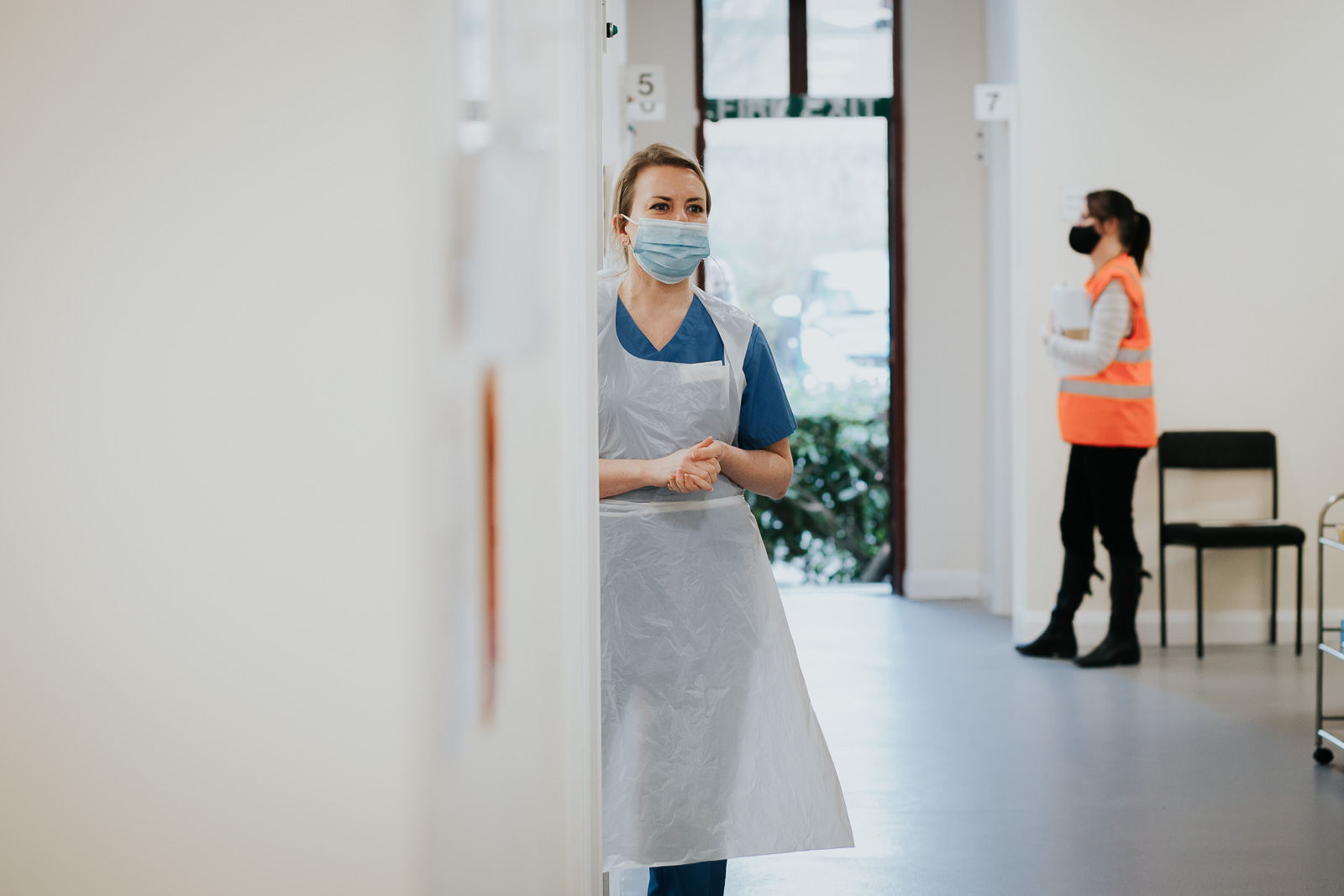
Dr Beverley Matta. Credit: Marge Bradshaw Photography
Some of the older generation were abandoned, she adds. Covid’s only kindness was to hit the UK in spring. “It could have been a very different story. A lot of them were left to their own devices and if it wasn’t for organisations like ours they could have died.
“These are the things the Covid Inquiry should be talking about – the actual real decisions that were made – not who said ‘fuck off’ to somebody else or who put that message on WhatsApp. That is completely irrelevant. Stop wasting taxpayers’ money on questions that are not meaningful, that are not going to bring about change, because we all know what they did. They put the rules down and they all broke them.”
Families in crisis - now
Monks – who says the “heartbreaking” economic harm done to Westhoughton by the pandemic makes her charity’s work even more vital to this day – echoes her friend.
“The money they’re all wasting on the inquiry they could be putting in for the families who are in crisis now. They’re wasting millions on that and we have so many families who are in crisis. They’re in food poverty, energy poverty, struggling with Christmas. That’s just to me a waste of money now. We’ve been there, done that. They set the rules and they broke them.”
Bolton hasn’t been entirely absent from the Covid Inquiry so far. Early documents submitted set the scene of widening health inequalities and diminished local resilience in the face of a crisis, both partly caused by austerity.
A minute of an October 2020 cabinet meeting records discussion of “strong and supportive” local leadership in Bolton that was improving restriction compliance and the rate of Covid transmission.
In contrast, in Preston “local leadership was lacking”. An extract from chief scientific adviser Sir Patrick Vallance’s diaries refers to him telling ministers that “Bolton worked but only because hospitality fully closed”.
But it is Andy Burnham’s statement and oral testimony to the inquiry that is most revealing about the town. Questioned last November by Dermot Keating, counsel to the inquiry, Greater Manchester’s mayor recalled the government imposing local restrictions on household mixing on 30 July 2020.
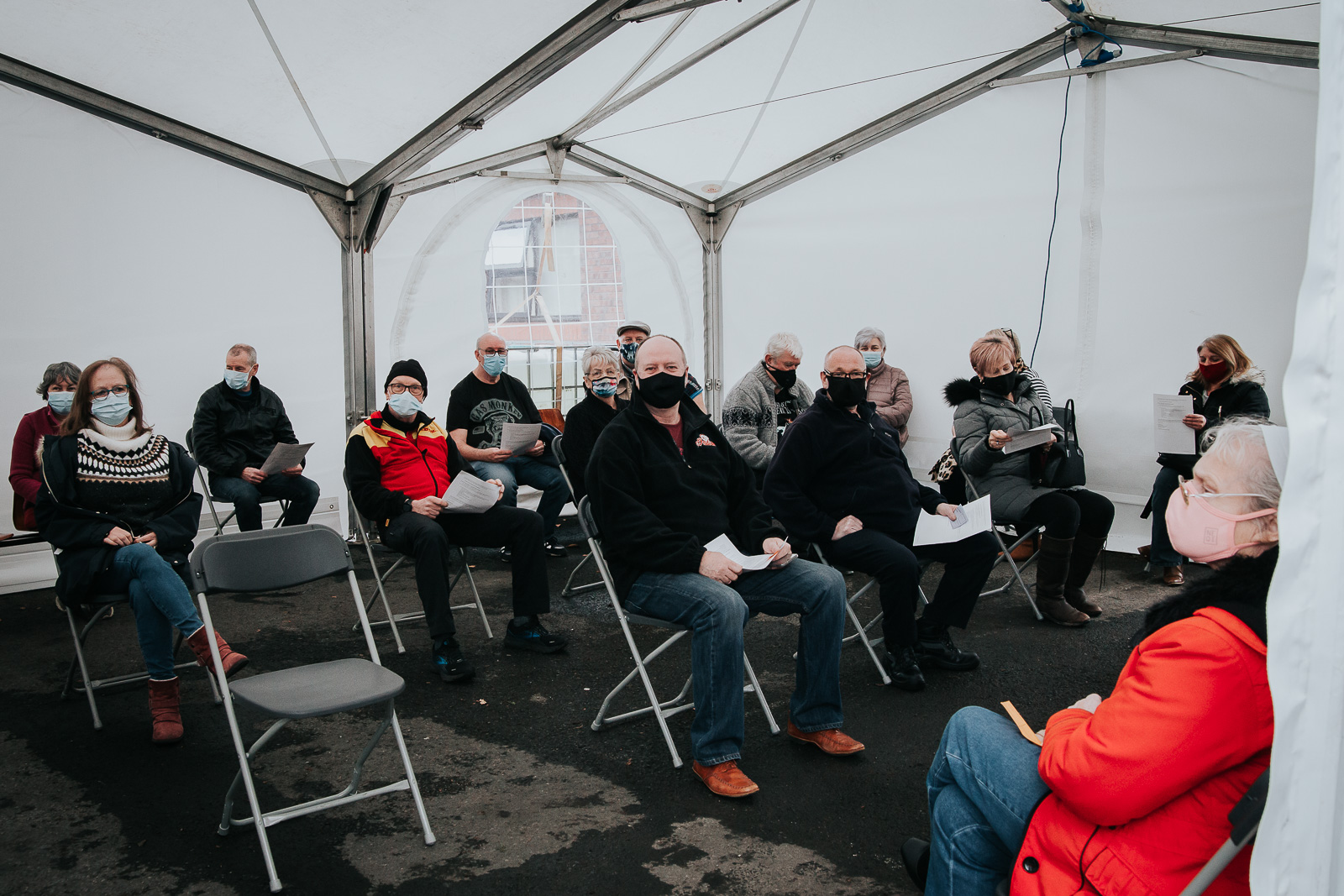
Westhoughton in the pandemic. Credit: Marge Bradshaw Photography
The health secretary Matt Hancock “gave me an hour to talk to our local leaders”, said Burnham, insisting that despite this he was ready to work with ministers. “But we did immediately start to make the point that this is going to have an impact on people. It’s going to have an impact on people’s businesses,” adding that people travelled between the 10 boroughs of Greater Manchester all the time and local restrictions weren’t practical.
Burnham was working closely with Bolton Council’s Conservative leader David Greenhalgh, who received widespread and cross-party tributes for his pandemic role when he died in July 2021. Greenhalgh was frustrated by the way the government was treating the town. “It was like no one else could see it, no one else in the country was bothered, but the impact there was really huge,” Burnham told the inquiry.
Then, on 8 September 2020, came further restrictions for Bolton. “From nowhere, all hospitality was closed in the borough of Bolton with no package of support for the businesses affected,” said Burnham.
He raised this “frequently” with Hancock. “To be fair, he was more sympathetic, actually, than some of the other ministers that I spoke to about this matter.
“From nowhere, all hospitality was closed in the borough of Bolton with no package of support for the businesses affected...”
“We were coming through the summer into the early autumn feeling increasingly frustrated. We’d spent pretty much the best part of year by now saying: look what’s happening here. Help us. Help us with the contact tracing. Give us that data. Help us, you know, support you to put in place measures, rather than this chaotic way, and particularly help our people and our businesses if you’re going to ask us to close them. And it felt like we were just shouting into the abyss in this period.”
A WhatsApp message between the health secretary and the mayor a few days later, discussing contact tracing and new powers on closures, is cordial (“Yes – that’s coming nationally for every local authority” - “Great, really welcome that”). But that was soon to change.
At a meeting between the country’s metro mayors and Hancock on 5 October 2020 the health secretary was told the mayors’ role in informing decision making and communication during the pandemic was frustratingly limited. They requested regular meetings. Two days later Burnham heard that northern pubs were to close – not from Hancock or even one of his officials, but from a newspaper headline.
Keating asked Burnham if he felt the north was left standing alone.
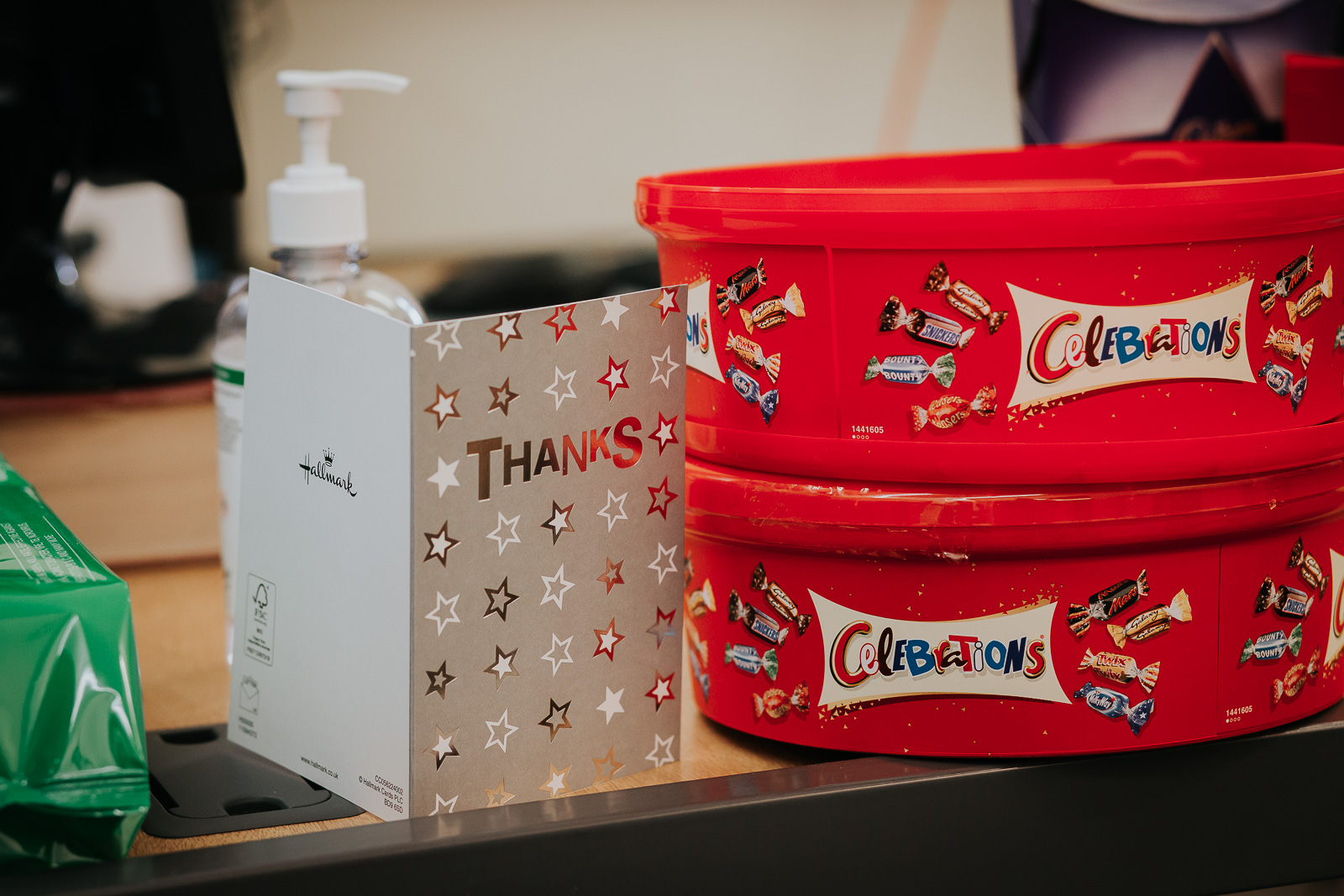
Westhoughton in the pandemic. Credit: Marge Bradshaw Photography
“Very much so. It just felt that we were treated in a way that other parts of the country wouldn’t be treated. There is no way – there is honestly no way that a borough in greater London or I would say in the wider South East would be treated like Bolton were treated. No way at all.”
In private – and famously in public, during a press conference outside Manchester’s Central Library – Burnham continued to rail against the government’s financial package to the city-region ahead of Tier 3 restrictions. Other areas were being offered more money and lighter restriction measures.
He said deputy chief medical officer Jonathan Van-Tam and members of SAGE knew Tier 3 would not work. A Covid-O cabinet committee minute at the time referred to Burnham’s behaviour as “appalling” but the mayor summarised its proposals as a “punishment beating” for Greater Manchester. He insists he was standing up for people in the city-region. No one in Bolton we spoke to disagreed.
Resilient, adaptive
During this period Dr Matta was absorbing guidance issued at 8pm and relaying it to colleagues in a 15-minute huddle at 8am the next morning – at least, to those staff who were there, because Covid was cutting them down too. She has nothing but praise for her team’s resilience – and the space they gave her for policy absorption. And patients were a virtue too, adapting to remote consultations and grateful for them. There was unprecedented communication between surgeries and hospitals over Covid admissions.
Matta wants the Covid Inquiry to acknowledge the pragmatism, innovation and speed of response – the “nimbleness” – of general practice. Indeed, she wishes that politicians had behaved more like GPs (and that they would better fund the NHS!).
Three miles away, Dr Saveena Ghaie’s experiences were similar – but with a different set of patients. She’s GP principal at Garnet Fold Practice, which has 7,000 patients in the Rumworth area of Bolton, where 43.1 per cent of the population are global majority, against 18.1 per cent for the town as a whole. A quarter of her patients are over 65 and there is high deprivation among them. Many of her patients are in care homes.
At home there were board games and she could walk their dog down the middle of deserted roads.
A deer even wandered off the moor into her garden.
“But there was a lot of guilt from us because we were going into the practices every day and my daughter, who was 13 at the time, was saying I want you to stay at home, mummy,” says Dr Ghaie.
“‘Everybody else’s mummy is at home. What happens if you and daddy get sick and you die?’ Things like that really got to us.”
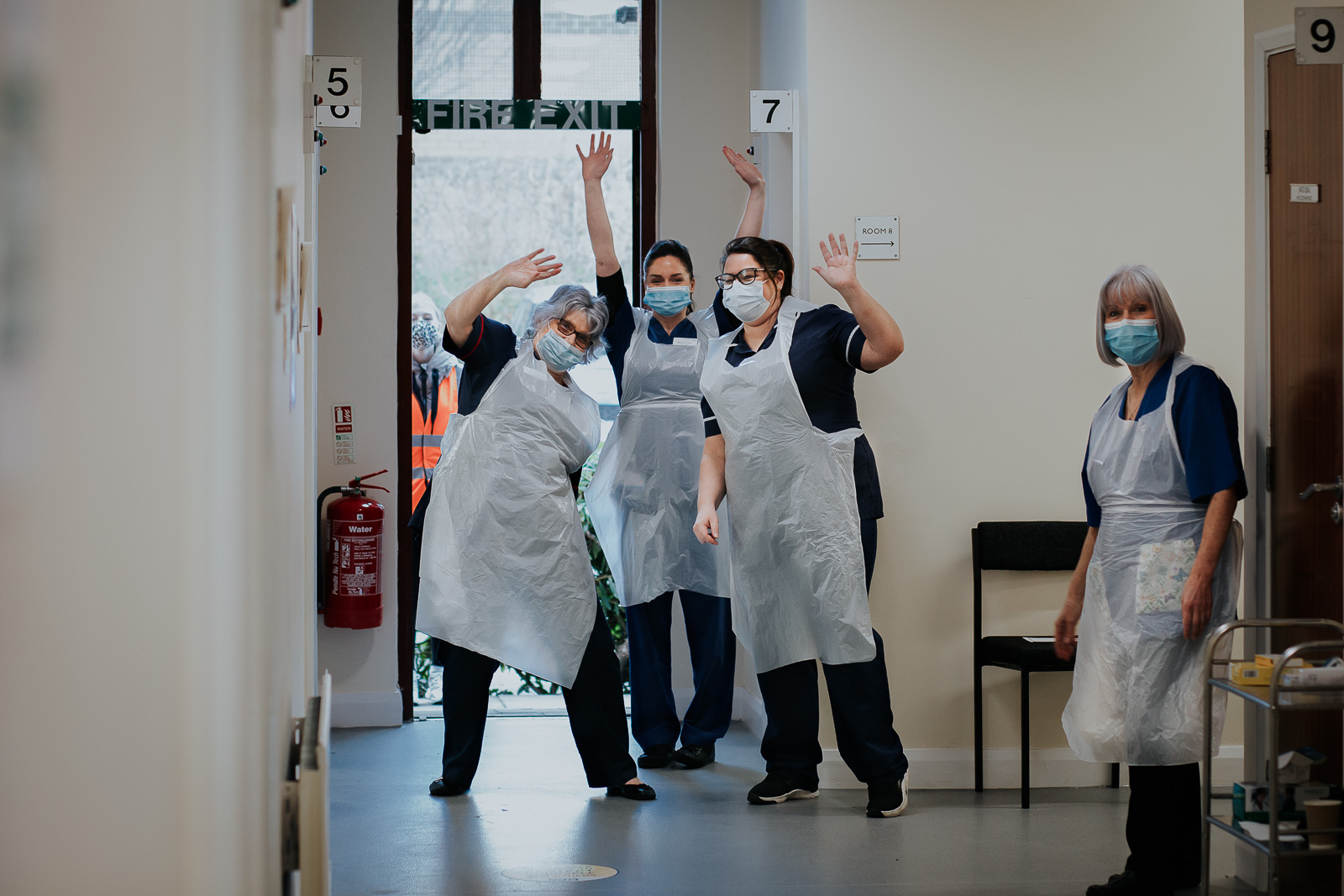
Westhoughton in the pandemic. Credit: Marge Bradshaw Photography
The practice wasn’t given any PPE to start, although some was left over from the Sars threat years earlier.
“We were calling all the medical supply companies but they didn’t have anything. We were trying to get stuff from Greater Manchester and central stores and in the end we said let’s see what Amazon have. We were getting boxes of gloves and stuff and were being told, don’t worry, we’ll pay you back, but you don’t know the quality.”
Supplies of aprons and oxygen saturation monitors started to come through in May 2020, but haphazardly, and her team – often depleted – started to treat patients who couldn’t receive medication in the usual way. People who had regular B12 vitamin injections were given oral medication instead, even if they absorbed it poorly. Patients taking warfarin couldn’t have their usual blood tests so had to be given other anti-coagulants – but needed screening first to see if that was safe. Patients receiving depot injections were switched to self-injection. They also wanted guidance on holiday regulations and other stuff the doctors couldn’t offer
But one of the biggest strains on doctors, says Dr Ghaie, also a director of Bolton GP Federation, was the move in care homes to establish everyone’s “do not resuscitate” status. “We had to understand from all those people in care homes what their wishes would be, and if they didn’t have capacity then what the wishes of their families would be.”
“We’re going to pull together. We’re going to mend the world. People were desperate to chip in.”
There was a fear among some patients and their families that they would be written off if they got Covid – not treated or sent to hospital. But the policy was actually about acknowledging what they wanted.
“We were anxious to make sure about that,” says Dr Ghaie. “We weren’t going into the care homes because if we had asymptomatic Covid we might bring something in so communication between care home and family and patient was really hard. There was a lot of anxiety about making sure we did well for those patients and we did right by those patients. That was really hard.”
She’s aware of the Covid Inquiry publicising some politicians’ “blasé statements” about losing bits of the population.
“You can’t do that, can you? You can’t say all those people in care homes, well, they don’t matter because they’re old or they’ve got dementia,” she says. “I’ve been a GP at the same practice for 20 years, known these patients for 20 years. You can’t just make those sweeping statements.”
She searches for a time when things started to improve and finds it on a photo on her phone dated 18 December 2020. What she jokes looks like a pizza delivery box actually contained the first vaccines. She wanted a slice of the action.
“We’re going to pull together. We’re going to mend the world. People were desperate to chip in.”
Bolton may get better answers from the inquiry’s next modules – on healthcare systems, vaccines, procurement and the care sector. But they won’t come quickly. Hallett’s unlikely to press send on her final report until 2027. Until then, the town’s vaccine response is worthy of record.
With initially low take-up, Bolton was quick to understand the need to get vaccines out to communities as well as getting people to come to clinics – and the key was making a bus run on time.
Dawn Lythgoe, performance, programmes and communications lead at Bolton GP Federation, who was managing the vaccine programme, says it was building on an existing culture of breaking down barriers to people accessing healthcare, particularly among communities that wouldn’t use mainstream services.
“I brought it up at a meeting,” says Lythgoe. “I said we need a bus, half-jokingly, but a commissioner was in the room and said: ‘Hang on, that’s not such a bad idea. Let’s just see what we could do around it.’ They went away and did some research and we made it happen.
“With all the brilliant people here who are all can-do, solution-focused, we don’t look at reasons not to do things. We find a reason to do them. Don’t find a reason not to vaccinate someone. Find a reason to vaccinate them.”
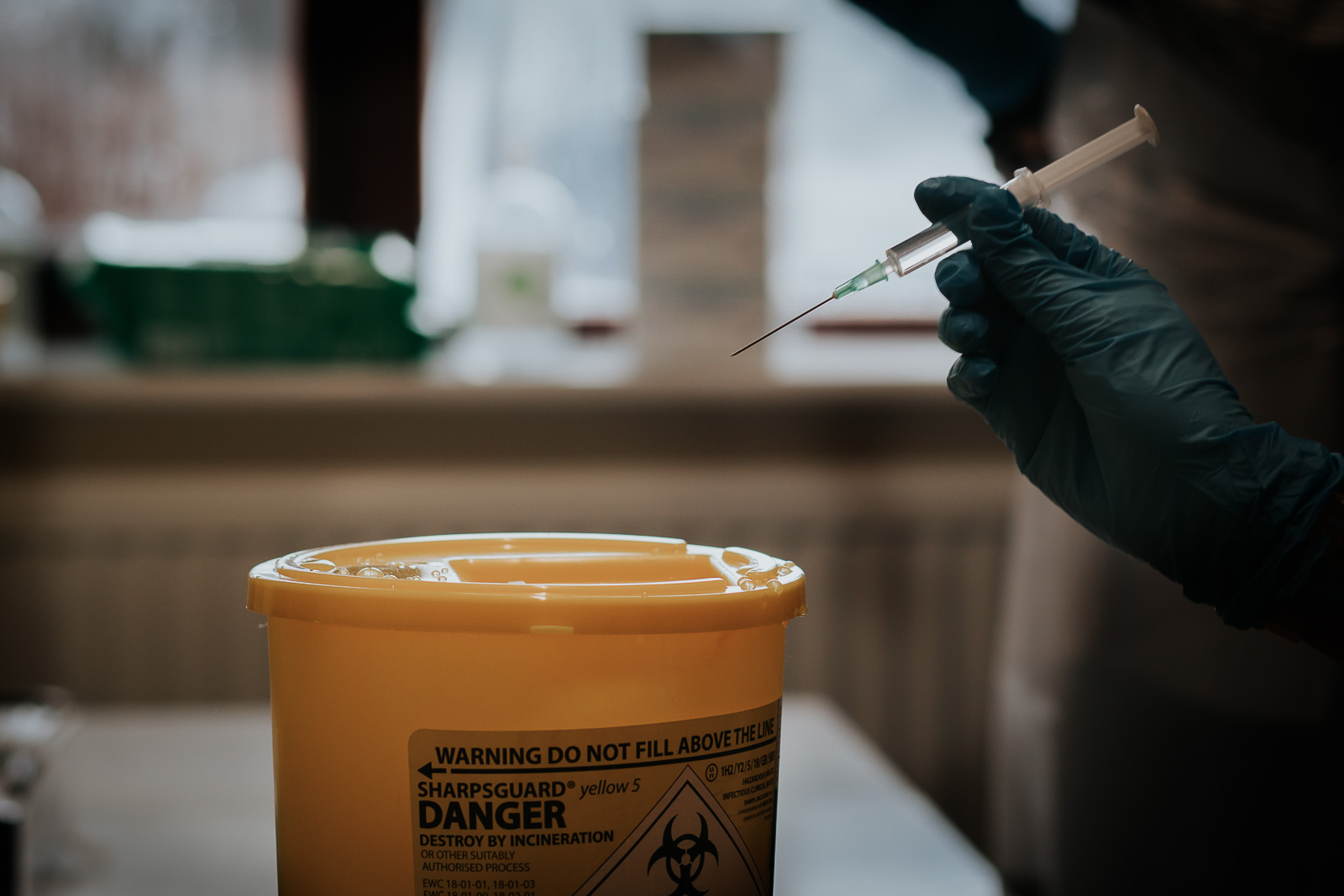
The team worked closely with community leaders, the voluntary sector, imams, priests and pastors, parking the bus up outside supermarkets, churches and mosques.
“The response to programme was much more positive, we learnt quickly, if and when we were invited into a geographical area or a community by that community. For example, a Hindu community asked us to park outside a temple. They did all the work, they moved that community and it would basically be jabs in arms all day,” says Lythgoe, praising a “social movement” that emerged.
"We were told we needed to set up a surge vaccine programme within 48 hours.”
Lythgoe says Bolton was first to vaccinate refugees and asylum seekers and among the first to run non-appointment clinics. It did a drive-through vaccination centre for taxi drivers. Nurses ran out to cars to jab people looking after children with severe special needs. But despite it all, infection rates soared because the new Indian variant had found its epicentre in the BL3 postcode, and another local lockdown was on the cards.
“We found out about the Indian variant 48 hours before the news broke, and we were told we needed to set up a surge vaccine programme within 48 hours,” says Lythgoe, her emotion and pride tempered by the recollection of the guilt she felt being away from her family during those long days and nights. “That was on a Wednesday night and by Friday we were at Essa Academy vaccinating thousands of people.”
The proud moment of camaraderie was recorded widely by national media as queues of grateful people stretched outside the BL3 school in dreadful weather, lines of St John Ambulance staff ready to jab away, groups of anti-vax protesters a minor irritant.
Sue Higson, who had taken redundancy from one of the big banks before volunteering and then getting taken on as a project manager for the vaccine programme, remembers the scramble to get IT equipment, Portaloos, security and big shelters as an exhilarating contrast to the way she worked in her previous career.
“The rulebook doesn’t go out of the window but the rulebook gets flexed to within an inch of its life,” she says. “That was really refreshing because there are no barriers – this happens now. We’re going to vaccinate thousands of people over one weekend.”
For Lythgoe and colleagues, one Covid legacy has been to embed the vaccine lessons into the way healthcare services are delivered now, and to disseminate the lessons as widely as possible outside the borough. But there’s a darker legacy too for Bolton that needs scrutinising.
Bolton people’s life expectancy is falling compared with the England average and its director of public health attributes 10 per cent of that gap to Covid. Dr Ghaie is still catching up on workload.
“We are seeing patients who have stayed in for two years, getting their shopping delivered, and not exercising or mobilising.
“You just see the loss of muscle bulk and the loss of posture, and they’ve become so much more frail so quickly. And mental function has been deteriorating because they’re not talking to anybody.
“Babies who are not good with strangers, who will scream all the way through an examination – they cannot be cajoled into allowing you to examine them in a calm fashion like you used to be able to do. There has been significant deterioration in the population that I don’t think has been properly understood yet.”
The Lead is now on Substack.
Become a Member, and get our most groundbreaking content first. Become a Founder, and join the newsroom’s internal conversation - meet the writers, the editors and more.


